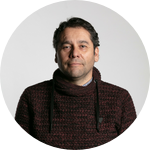Project Results
Today I can finally announce that the results of this research have been published in a scientific journal!
We have found Salmonella with an antibiotic resistance gene that is found worldwide in humans and domestic animals, but had only been reported once in a wild animal. These Salmonella were isolated from penguins that were in protected areas and had no contact with humans. It is suspected that they may have been contaminated by waste water being dumped at sea, or by contaminated seagulls in urban environments that then went to this island. In any case, it is a worrying finding as these genes have arisen from the misuse of antibiotics in human and veterinary medicine... and are a challenge for the treatment of bacterial diseases...
I would like to thank once again all the people who supported me and made it possible for me to start this research, which has been the beginning of my research career. Without you I could not have done it! Thank you very much!
About This Project
Penguins are suffering population declines due to a variety of human causes, including disease. One indicator of these could be the presence of Salmonella, a very serious bacterium that infects multiple species. Salmonella will be isolated from two penguin colonies with different anthropogenic influence and its resistance to antibiotics will be measured. This could serve as a basis for establishing preventive measures in areas where the wildlife-human interface may pose a risk to both.
Ask the Scientists
Join The DiscussionWhat is the context of this research?
Anthropogenic stress increases the likelihood of disease in animals, lowering their immune system and increasing the risk of transmission.
Penguins are the world's second most endangered seabird group and the fact that they are so cute and funny makes them a tourist attraction. However, this has negative impacts on them.
One way to assess how this stress may negatively impact them is through the study of Salmonella and its anti-microbial resistance. Salmonella has been isolated from penguins before and was found to be more prevalent in areas closer to human settlements. Also, its resistance has increased in recent years due to the abuse of antibiotics.
This is why we want to look for the relationship between anthropogenic influence and the trend of this bacterium.
What is the significance of this project?
Salmonella can cause very serious disease, is widely spread and infects a multitude of species. If its distribution and risks are known, better preventive measures can be implemented to safeguard the health of wild animals as well as that of humans and domestic animals.
If human activity increases the possibility of disease in penguins, it increases the possibility of these populations disappearing. Therefore, wildlife managers can use this information to prevent anthropogenic impact on penguin populations and keep them healthy and stable. Additionally, if penguins near human populations have higher rates of infections, then it is important that actions be taken to protect humans and domestic birds from also becoming infected.
What are the goals of the project?
Investigate whether Salmonella prevalence and its antibiotic resistance is proportional to the level of anthropogenic influence in two penguin colonies in Chile. Environmental faecal samples will be taken to not disturb the welfare of the animals. Approximately 200 samples shall be taken from Cachagua island and 80 from Pájaro Niños Islet. Samples will be incubated, characterised and tested for antibiotic resistance in the laboratory of the Veterinary Faculty of the University of Chile. A higher prevalence and antibiotic resistance of Salmonella is expected in Pájaro Niños, where the level of human impact is higher. As the sample number is very small, this could serve as a basis for future research in larger areas, to confirm this hypotesis.
Budget
Without this money it would be impossible to realise this project. The transport and the stay there are essential for the collection of samples, which cannot be processed without laboratory equipment.
Endorsed by
 Project Timeline
Project Timeline
Sampling will be carried out from September until December.
Samples are intended to be taken on 9 different days for Isla Cachagua and 3 for Islote Pájaro Niños. On the same day or the following day, the samples will be sent to the laboratory for processing and will be analysed during the following days.
The results are expected to be shown in March and the complete work finally exhibited in June.
Jul 01, 2022
Project Launched
Sep 10, 2022
Travel to Santiago de Chile
Dec 10, 2022
Sampling and analizing at the laboratory
Mar 10, 2023
Show first results
Jun 10, 2023
Ending the project
Meet the Team
Affiliates
Team Bio
A volunteer assistant will be sought for the sampling.
The work will be supervised by Dr. Peter Lurz, lecturer at the University of Edinburgh and by Dr. Patricio Retamal Merino, lecturer at the University of Chile, who will help me with the laboratory work.
Clara Maria Wiederkehr Bruno
My name is Clara María Wiederkehr Bruno, I am a veterinary surgeon graduated from the Complutense University of Madrid in 2019. I am currently studying a Master's degree in Conservation Medicine at the University of Edinburgh, for which I have to carry out a conservation project for my final year and it is for which I want to carry out this research.
I have always been passionate about and focused my career on wildlife, with a special affinity for penguins. I currently live in Costa Rica, working in a veterinary hospital with wild animals and dogs and cats.
However, it has been thanks to the master's degree and the last few years that I have developed a keen interest in conservation, broadening my focus from wildlife medicine to the conservation of their ecosystem and their relationship with domestic animals and humans. It is for this reason that I believe it is essential to research and learn more about the status of these animals, in order to be able to propose solutions and preventive measures to the destruction of their habitats.
Neil Anderson
I am a Senior Lecturer at the University of Edinburgh where I am the Programme Director of the MVetSci Conservation Medicine and MSc One Health programmes. I qualified as a veterinarian in 1996 and completed a PhD in wildlife epidemiology from the Centre for Tropical Veterinary Medicine in 2009. I have field experience working with free-ranging wildlife populations in southern Africa and the UK.
My research focusses on wildlife health and the application of interdisciplinary One Health and Conservation Medicine approaches. I have a particular interest in disease transmission across the human-wildlife-livestock interface and I have specific expertise on the ecology and epidemiology of African trypanosomiasis. I also provide veterinary and scientific support for conservation projects including the South of Scotland Golden Eagle Project for which I am Chair of the Scientific Advisory Panel.
Additional Information
References
Uhart M, Vanstreels RET, Gallo L et al. Serological survey for select infectious agents in wild magellanic penguins (Spheniscus magellanicus) in Argentina, 1994–2008. Journal of Wildlife Diseases 2020;56:66–81.
Valdés-Velasquez A, de La Puente S, Cardeña-Mormontoy MA et al. Humboldt Penguin (Spheniscus Humboldti) Range-Wide Phylogeography of the Fur Seals from South America and Oceania and Phylogenomics of Otariidae View Project EISA-Project View Project., 2016.
Meza KF. Aislamiento de Cepas de Salmonella Enterica Desde Pingüinos de Magallanes (Spheniscus Magellanicus) de La Región de Magallanes y Antártica Chilena y Determinación de Resistencia a Antibióticos., 2013.
IUCN. The IUCN Red List of Threatened Species.
Parra M, Durango J, Máttar S et al. Microbiología, Patogénesis, Epidemiología Clínica y Diagnóstico de Las Infecciones Producidas Por Salmonella., 2002.
Olsen B, Bergström S, McCafferty DJ et al. Salmonella enteritidis in Antarctica. The Lancet 1996;348:1319–20.
Author A, Oelke H, Steiniger F. Salmonella in Adélie Penguins (Pygoscelis Adeliae) and South Polar Skuas (Catharacta Maccormicki) on Ross Island., 1973.
Retamal P, Llanos-Soto S, Salas LM et al. Isolation of drug-resistant Salmonella enterica serovar enteritidis strains in gentoo penguins from Antarctica. Polar Biology 2017;40:2531–6.
Sepulveda F. Breeding Distribution and Abundance of Seabirds on Islands off North-Central Chile Related Papers.
Dougnac C, Pardo C, Meza K et al. Detection of Salmonella enterica in Magellanic penguins (Spheniscus magellanicus) of Chilean Patagonia: Evidences of inter-species transmission. Epidemiology and Infection 2015;143:1187–93.
Performance Standards for Antimicrobial Disk Susceptibility Tests., 2015.
Jacobson AP, Riggio J, M. Tait A et al. Global areas of low human impact (‘Low Impact Areas’) and fragmentation of the natural world. Scientific Reports 2019;9, DOI: 10.1038/s41598-019-50558-6.
Project Backers
- 54Backers
- 100%Funded
- $5,525Total Donations
- $102.31Average Donation


